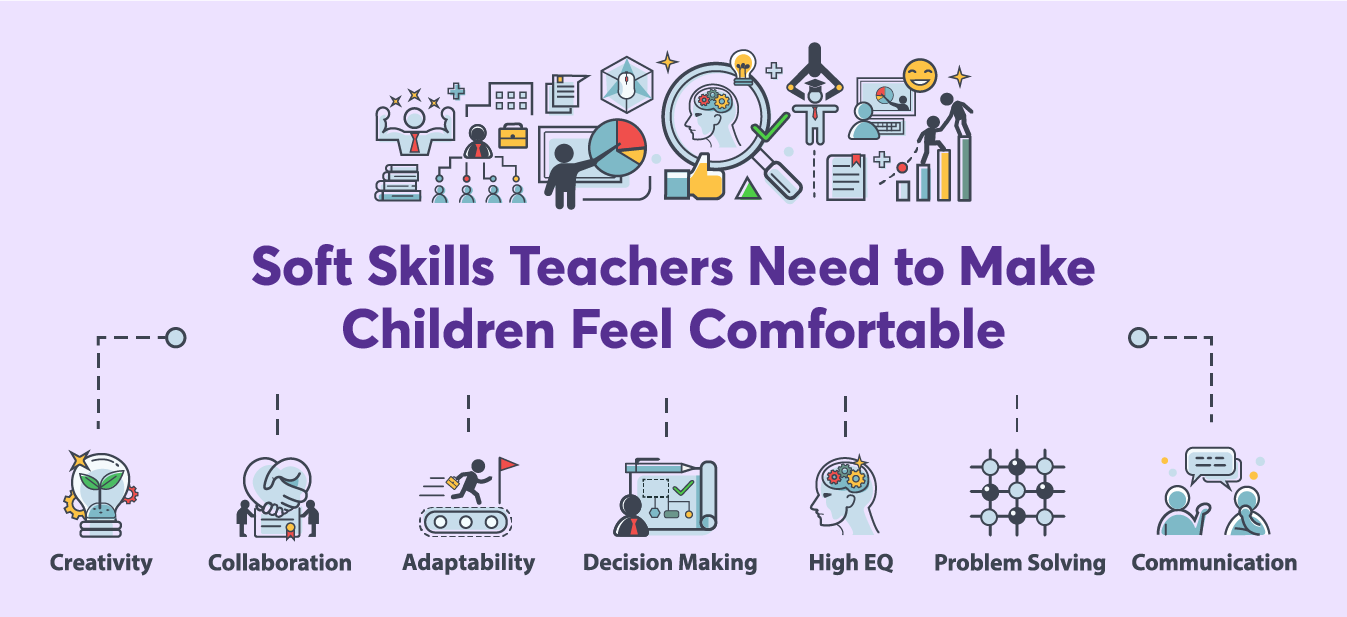The first day of school is full of excitement, nerves, and uncertainty. But it’s also the start of a new year and a fresh beginning. To ensure that each student in their class feels welcome and safe, teachers must be aware of how they interact with children, both in and out of the classroom. A teacher’s interactions with students can have a lasting positive effect on how their students view themselves and others.
A teacher’s job is not just to teach the students, but also to give them a sense of self-esteem and confidence, which can be achieved only if they have the right mix of soft skills and hard skills. In addition, teachers can use soft skills to help students develop a positive relationship with learning, improve their behaviour and motivation, increase academic achievement, and enhance their lives.
Below are some of the soft skills that can help teachers make their students feel comfortable:
✏️ Strong Communication Skills
In the age of social media, it is easy to forget that a large part of school involves personal interaction between teachers and students. That’s why effective communication is so vital in the classroom. Effective communication means that teachers can effectively convey their thoughts and ideas while keeping the flow of information open and accessible.
Communicating well with parents, students, and administrators is the foundation of trust in the classroom, which allows for open dialogue about what’s going well and what needs to be improved. Moreover, teachers need to communicate with each other daily to collaborate on lesson plans, discuss student performance, and clear up any conflicts that may arise between students.
Assertive communication can also help teachers give feedback to students in a non-threatening way, allowing them to improve their performance without feeling threatened or belittled. When talking with parents about a child’s progress or difficulties with classroom material, it helps teachers gain their trust if they approach the conversation in a sensitive manner to show they care about the student as an individual while remaining professional.
✏️ Emotional Intelligence
Empathy is one of the most important qualities a teacher can possess because it helps them understand where each child is coming from and what they need from them at that moment. In addition, a student who feels understood will be less likely to react negatively to things, whether they are solving a difficult homework assignment or leading a stressful home life.
Too often, teachers are so focused on what they want to accomplish with the lesson that they forget to consider the needs of their students. They may assume they know what’s best for everyone in their class and neglect listening to anyone else’s suggestions. Without empathy, it’s easy for teachers to become disconnected from the people they’re teaching, leading to an environment where children feel unwelcome and insecure.
✏️ Critical Thinking & Problem-Solving Skills
A teacher must be able to deal with problems that are unrelated to the classroom but could directly impact learning outcomes. For example, teachers must know how to handle a disruptive student, make an informed decision about curriculum changes, or what to do when students are dealing with social problems at home.
To solve these types of problems, teachers must organize their thoughts effectively and be able to apply their knowledge effectively. They must be able to assess the situation before them and then ask questions that will lead them to the best course of action for the given situation. Teachers need to be able to recognize which problems require their attention and which ones can wait until later.
Critical thinking is essential because it helps teachers make meaningful lesson plans that engage students and keep them interested in the material being presented. By thinking critically about their lesson plans, teachers can discover what works best for them and their classrooms, allowing them to create lessons that will help their students thrive.
✏️ Show Patience
Patience is an important attribute for teachers to learn because it helps them deal with the personalities and behaviours of problematic students. For example, there may be a student with a daily temper tantrum or another student who will not follow the classroom rules. Patience helps teachers deal with these students’ issues and lets them control their frustration when dealing with them. It also keeps them from appearing rude or disrespectful in the eyes of their students and co-workers.
And since teachers deal with kids, frustrations will likely arise on both sides of the teacher-student relationship. But moving past those frustrations quickly can keep a bad situation from escalating into something much worse.
By learning soft skills, teachers not only assist their students in building essential discipline, guidance and management of the classroom, but they also extend their careers by furthering their knowledge. Square Panda India empowers teachers by helping them develop soft skills and essential 21st century skills to build stronger relationships with students, leading to better learning outcomes. To know more, visit ecce.squarepanda.com

